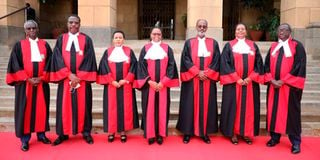Premium
The two contested issues that could decide fate of BBI

Chief Justice and President of the Supreme Court Martha Koome (centre) and Deputy Chief Justice and Vice-President of the Supreme Court Philomena Mwilu (third left) with Supreme Court Judges (from left) Isaac Lenaola, Dr Smokin Wanjala, Mohamed Ibrahim, Njoki Ndung’u and William Ouko at the Supreme Court Building in Nairobi.
What you need to know:
- The proposed amendments were endorsed by 4.5 million voters who appended their signatures, paving way for a referendum.
- On January 21, IEBC verified and confirmed 1.13 million signatures for the BBI. and sent the Bill to county assemblies for consideration.
The Supreme Court’s verdict on two contested issues will today decide the fate of the campaign to amend the constitution under the Building Bridges Initiative (BBI).
These are whether the President can initiate amendments to the constitution through a popular initiative and whether the supreme law has a basic structure that is ring-fenced from routine changes.
A few questions will offer insights into the matter in court: What’s the basic structure of the constitution? Was it affected by the proposed changes in the BBI? What’s the process of amending it?
Lawyer Elias Mutuma says the findings of the court on the two issues would determine whether the push by President Uhuru Kenyatta to amend the constitution was an illegal venture, or the unfavourable decisions of the lower courts only deferred his dream.
“The basic structure doctrine protects the ‘core element’ of a constitution and prevents amendments. In Kenya, the ‘basic structure’ includes the form of governance provided for in the constitution. The BBI proposed change of system of governance from presidential to hybrid,” he argues.
“The decision of the court on the applicability of the basic structure doctrine will affect the BBI Bill.”
Another lawyer, Mr Omoke Morara, says even if the Supreme Court allows the BBI process to continue, the proponents will have to start afresh.
Also read: Kenya awaits BBI ruling with bated breath
“The Attorney-General and the BBI secretariat have never challenged a finding of the High Court that the voters were entitled, at a minimum, to copies of the Constitution of Kenya Amendment Bill in the constitutionally-required languages namely, English, Kiswahili and braille. The copies ought to have been made available in other communication formats and technologies accessible to persons with disabilities including Kenya Sign Language as required under Article 7(3)(b) of the Constitution,” he says.
“Voters were entitled to be given sufficient information to enable them to make informed decisions on whether or not to append their signatures in support of the proposed constitutional amendments.”
He argues that without such compliance, the promoters of the BBI are not yet out of the woods even if they get a favourable judgment. They are staring at potential legal actions should they decide to resume the process.
The proposed amendments were endorsed by 4.5 million voters who appended their signatures, paving way for a referendum.
On January 21, the Independent Electoral and Boundaries Commission (IEBC) verified and confirmed 1.13 million signatures for the BBI and sent the Bill to county assemblies for consideration.
Among the issues that triggered the filing of eight petitions at the High Court in September 2020 on the legality of the BBI, was involvement of President Uhuru Kenyatta. The Supreme Court will be determining whether the President can initiate changes/amendments to the constitution.
The judges will also determine whether an amendment can only be initiated by the House through a parliamentary initiative under Article 256 or through a popular initiative under Article 257. In regard to the basic structure, the court will rule whether the principle is expressly provided for in the constitution, or it is just implied.
If it is applicable, the court will have to trace its origin and state the extent of its application, whether it can only be altered through the primary constituent power, and what constitutes the primary constituent power.
Another key issue is on the interpretation of Articles 88 and 250 with respect to composition and quorum of IEBC. The main issue for settlement will be the object of Article 250(1), which sets the minimum number of commissioners of the IEBC at three. The IEBC Act places minimum quorum at five commissioners to conduct its business.
If the commission is considered legitimately constituted with three members, the court is expected to determine whether an Act of Parliament can set a higher legitimacy threshold for an independent commission than that set by the constitution.
The findings will have ramifications on the general election as some of the preparatory decisions were made by the agency at a time it lacked quorum, provided in the IEBC Act, to conduct its business. Also in limbo are 30 by-elections conducted by the commission between 2018 and September 2021.
The judges will also determine whether the Second Schedule to the Constitution of Kenya (Amendment) Bill, 2020 was unconstitutional. This was about delimitation of the 70 constituencies proposed by BBI promoters.
The proposed constituencies were to be created in 28 counties. The Supreme Court will determine whether the proposal amounted to usurpation of the mandate of the IEBC. The Supreme Court will also determine whether civil proceedings can be instituted against the President with regard to anything done contrary to the constitution.
It will also rule on the place of public participation under Article 10 vis-a-vis the role of IEBC under Article 257 (4). The court will also make a finding on whether interpretation of Article 258 (10) requires that all specific proposed amendments should be submitted as separate and distinct referendum questions.





